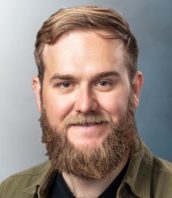
IC COHORT 5_6: Sam Evans pushing the envelope further using a waste-derived carbon material to filter water
 (EDITOR’S NOTE: This is the final article in a series introducing the innovators in Cohort 5 of “Innovation Crossroads.” Each founder was featured in an article focused on their company. Cohort 5 started “Innovation Crossroads” on June 21. Find the rest of the series at these links: Sentinel Devices, Addiguru, Hempitecture, DayLyte Batteries, and FC Renew.)
(EDITOR’S NOTE: This is the final article in a series introducing the innovators in Cohort 5 of “Innovation Crossroads.” Each founder was featured in an article focused on their company. Cohort 5 started “Innovation Crossroads” on June 21. Find the rest of the series at these links: Sentinel Devices, Addiguru, Hempitecture, DayLyte Batteries, and FC Renew.)
By Kailyn Lamb, Marketing Content Writer and Editor, PYA
Sam Evans, Founder and Chief Executive Officer of Unbound Water Technologies, is pushing the envelope further using a waste-derived carbon material to filter water.
Evans, a member of Cohort 5 of the “Innovation Crossroads” program through Oak Ridge National Laboratory (ORNL), said that while carbon has been used to filter water for a while, his key innovation involves the combination of two water treatment materials – carbon and iron nanoparticles. The carbon, which is made from tire waste, acts as a scaffolding for the iron, and increases the material’s absorption capacity. He added that there is a critical need for advanced water remediation technologies due to the variety of toxic species introduced into our waterways from industrial activities.
“The dizzying array of pollutants in our environment threatens the health of current and future generations,” he said. It is this need that pushes Evans to work on technological applications that will help improve the well-being of our waterways.
Evans’ technology using waste tires and iron nanoparticles goes beyond current carbon-based water treatment techniques because it interacts with a diverse set of pollutants and has an increased absorption capacity. What makes his work at Unbound Water Technologies unique is the synthesis process that combines the two technologies, Evans said.

“We know carbon interacts with pollutants, but we are integrating another material that increases efficacy and interacts with a broader set of pollutant species,” he said. “What we’re offering here is a composite of the technology that really ties together the two of those so that they’re better than each one separately.”
Although Evans joked he was the youngest company in the “Innovation Crossroads” program –he incorporated in May, he has been familiar with the program’s work since it was started in 2017.
Evans received his Ph.D. in Energy Science and Engineering from the Bredesen Center for Interdisciplinary Research and Graduate Education at the University of Tennessee, Knoxville, and did much of his research work at ORNL. Because he was on an entrepreneurial track within his doctorate program, he had the opportunity to interact with members of Cohort 1 of “Innovation Crossroads.”
When the time came for him to graduate, Evans said he wanted to apply to “Innovation Crossroads” rather than work for a company or continue to do post-doc work. He called the program unrivaled in the opportunities it provides to entrepreneurs just getting started.
“For where I want to be right now, it’s a really exciting opportunity,” Evans said.
In deciding he wanted to join “Innovation Crossroads,” Evans said he looked at the portfolio of work he did during his Ph.D. and knew he wanted to do something in water treatment. He explained that working on a technology that improves the well-being of people and the planet were paramount in this decision.
Growing up in Charleston, SC, Evans said he often saw first-hand how trash on the beach impacted the area. Participating in beach clean-ups taught him about the importance of environmental stewardship but working in science revealed that there’s a world of pollutants we can’t see.
“I really care about water,” he said. “As I started training more and more as a chemist, I realized there’s microscopic materials, like micron and nano-sized things, that are floating all around us. It’s something you can’t see, so you don’t really think about it.”
Evans continued by saying many of these microscopic materials are pollutants that harm our waterways, environments, and bodies. He mentioned that he is honored to commercialize a material developed during his Ph.D. that will have real-world impact.
As a member of Cohort 5, Evans will focus on research and development and scale-up to prepare for commercialization. Because his technology uses tire waste for his carbon, he can offer an affordable product while reducing another waste source.
The ideals of a circular economy were also important to Evans when he developed the idea for his company. For him, it is important for technological processes to align with sustainable business goals.
“There are millions to probably billions of waste tires generated in the U.S. alone that end up in the landfill or are burned for energy,” Evans said. “By using one waste to clean up another waste, we are aligning our goal of sustainability with our business practices.”
Like what you've read?
Forward to a friend!

